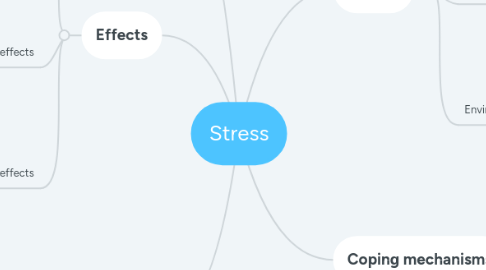
1. Definitions
1.1. Psychological stress
1.2. Chronic stress
1.3. Acute stress
2. Effects
2.1. Physical effects
2.1.1. Headache
2.1.2. High blood pressure
2.1.3. Heart disease
2.1.4. Diabetes
2.2. Emotional effects
2.2.1. Anxiety
2.2.2. Depression
2.2.3. Irritability
2.2.4. Insomnia
2.3. Cognitive effects
2.3.1. Impaired concentration
2.3.2. Difficulty making decisions
2.3.3. Forgetfulness
3. Prevention strategies
3.1. Stress management techniques
3.1.1. Time management
3.1.2. Setting realistic goals
3.1.3. Breaks and rest
3.2. Building resilience
3.2.1. Improving emotional intelligence
3.2.2. Cultivating optimism
3.2.3. Maintaining physical health
3.3. Promoting a positive work environment
3.3.1. Clear communication
3.3.2. Recognizing employee efforts
3.3.3. Encouraging a work-life balance
4. Causes
4.1. Personal problems
4.1.1. Health issues
4.1.2. Financial issues
4.1.3. Relationship issues
4.2. Work-related stress
4.2.1. Overwork
4.2.2. Lack of support
4.2.3. Unrealistic targets
4.2.4. Harassment
4.3. Environmental stressors
4.3.1. Natural disasters
4.3.2. Pollution
4.3.3. Loud noise
5. Coping mechanisms
5.1. Relaxation techniques
5.1.1. Meditation
5.1.2. Deep breathing
5.1.3. Yoga
5.2. Healthy lifestyle choices
5.2.1. Regular exercise
5.2.2. Balanced diet
5.2.3. Adequate sleep
5.3. Social support
5.3.1. Family and friends
5.3.2. Professional help
5.3.2.1. Counselling
5.3.2.2. Therapy
5.3.2.3. Support groups
